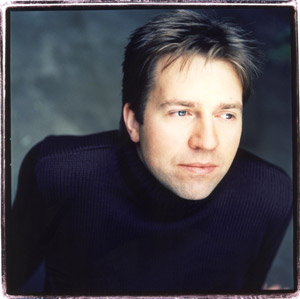

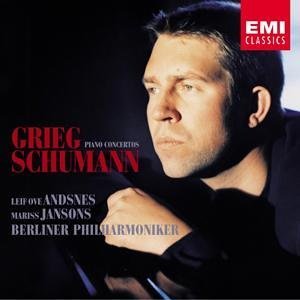 LOA: That, of course, depends on the piece!
Some pieces are very much solo concertos with accompaniments, some are very
symphonic, and some are with the piano more accompanying than actually playing
the solo parts. The Grieg Concerto,
which I’ve played very much, I find quite easy to work — even
with second-rate orchestras — because it’s very much
divided into solo parts for the pianist and then comes the orchestra.
So for me, it can feel comfortable even with a less-good orchestra.
However, if you’re playing the Prokofiev Third Concerto, it’s much more integrated
into the orchestra, and you really need a good conductor. Of course,
it’s always much more enjoyable to have a really good partner.
LOA: That, of course, depends on the piece!
Some pieces are very much solo concertos with accompaniments, some are very
symphonic, and some are with the piano more accompanying than actually playing
the solo parts. The Grieg Concerto,
which I’ve played very much, I find quite easy to work — even
with second-rate orchestras — because it’s very much
divided into solo parts for the pianist and then comes the orchestra.
So for me, it can feel comfortable even with a less-good orchestra.
However, if you’re playing the Prokofiev Third Concerto, it’s much more integrated
into the orchestra, and you really need a good conductor. Of course,
it’s always much more enjoyable to have a really good partner.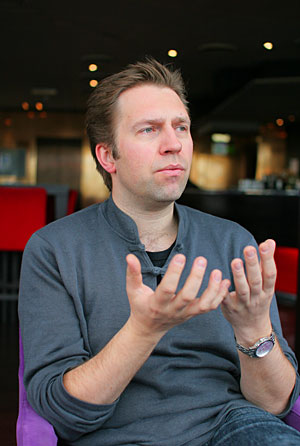 LOA: I’m not a great one for completeness, actually!
I think I will not do the complete set. I will do the five concertos
— that’s one of the few complete sets I will do! But somehow,
people seem to get really obsessed with this idea of doing things complete,
doing a whole opus always complete. Often it’s not meant like that
from the composer. You can very easily pick etudes from an opus or
preludes from an opus, and do a selection. I find it’s sometimes more interesting,
more personal.
LOA: I’m not a great one for completeness, actually!
I think I will not do the complete set. I will do the five concertos
— that’s one of the few complete sets I will do! But somehow,
people seem to get really obsessed with this idea of doing things complete,
doing a whole opus always complete. Often it’s not meant like that
from the composer. You can very easily pick etudes from an opus or
preludes from an opus, and do a selection. I find it’s sometimes more interesting,
more personal.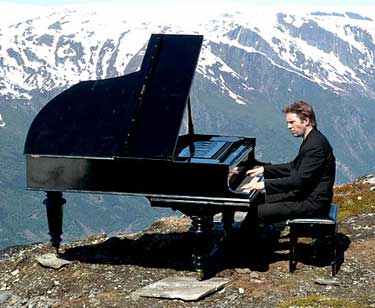 BD: Is there ever a chance that there’s too many
notes?
BD: Is there ever a chance that there’s too many
notes?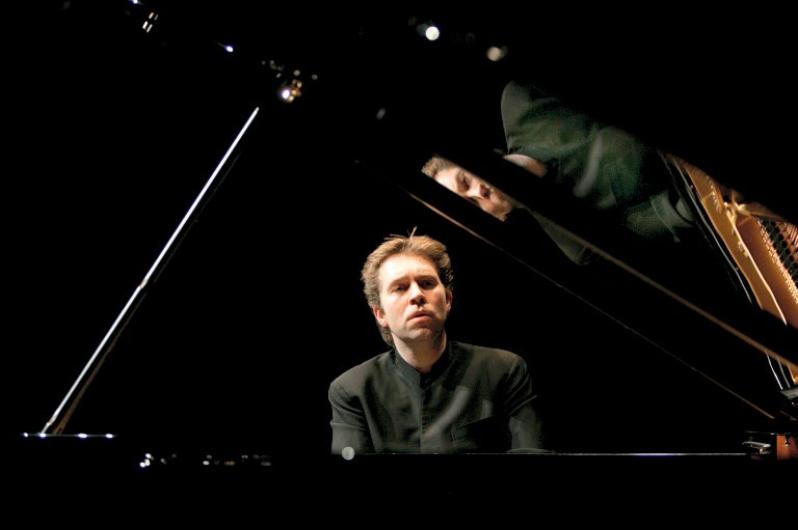 BD: It has to take care and feeding like a cherished
pet!
BD: It has to take care and feeding like a cherished
pet!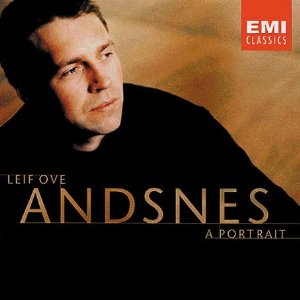 LOA: I try not to. What I’m really after in
my recordings is a real live feeling, that it’s supposed to sound like a
performance. When listening to recordings I’m very often disappointed
that it doesn’t sound like a performance; it sounds like notes. This
also comes from the way people record these days. I would say most
people record in small takes; that means a few bars, or maybe one page.
Then they repeat that and then do the next segment. Or they will do
a lot of patching. They will maybe do one or two complete performances,
and lots of patching. It’s a real hassle to put it together.
LOA: I try not to. What I’m really after in
my recordings is a real live feeling, that it’s supposed to sound like a
performance. When listening to recordings I’m very often disappointed
that it doesn’t sound like a performance; it sounds like notes. This
also comes from the way people record these days. I would say most
people record in small takes; that means a few bars, or maybe one page.
Then they repeat that and then do the next segment. Or they will do
a lot of patching. They will maybe do one or two complete performances,
and lots of patching. It’s a real hassle to put it together. 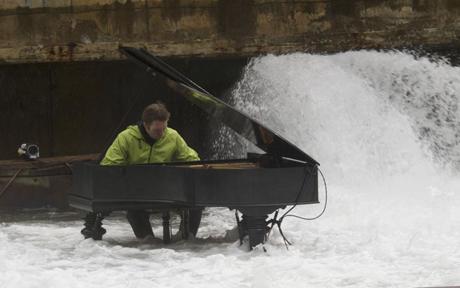 LOA: I play around seventy to seventy-five concerts
each year, and that’s about how much I want to do. I probably could
have played more, but I want to have periods where I study new repertoire,
and just have some holiday as well. It’s important for me to be at
home for periods, and also have a social life and friends. So when
I’m traveling I don’t like to be away from home for more than three weeks
in one go.
LOA: I play around seventy to seventy-five concerts
each year, and that’s about how much I want to do. I probably could
have played more, but I want to have periods where I study new repertoire,
and just have some holiday as well. It’s important for me to be at
home for periods, and also have a social life and friends. So when
I’m traveling I don’t like to be away from home for more than three weeks
in one go.| The internationally acclaimed
pianist Leif Ove Andsnes has been referred to as “an eminently sensual musician,
an artist capable of grace and introspection” by the Financial Times whilst
the BBC Music Magazine commented on "how hard it is to over-praise the vitality
and distinction of this princely pianist." In addition to giving recitals and playing concertos each season in the world’s leading concert halls and with the all the foremost orchestras, Andsnes is an avid chamber musician who joins select colleagues each summer at Norway’s Risør Festival of Chamber Music, of which he is co-artistic director. The New York Times has placed Risør amongst the top 10 musical events of the year. 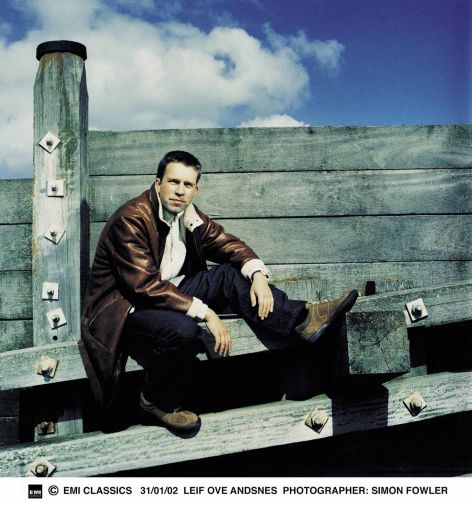 Leif Ove Andsnes opened the 2009/2010 season in Copenhagen performing Rachmaninov
Piano Concerto no. 2 with the Danish National Symphony Orchestra and Thomas
Dausgaard. He went on to perform the same work with the Bergen Philharmonic
under Andrew Litton and then moved his attention to Rachmaninov’s Piano Concerto
no. 4 which he performs this season with the Royal Scottish National Orchestra
and Stephane Deneve, the Gothenburg Symphony Orchestra and Gustavo Dudamel
and the Academy of Santa Cecilia and Antonio Pappano. In May 2010 Andsnes
performed and recorded Rachmaninov’s fourth concerto with the London Symphony
Orchestra and Antonio Pappano for release this Autumn by EMI Classics.
Leif Ove Andsnes opened the 2009/2010 season in Copenhagen performing Rachmaninov
Piano Concerto no. 2 with the Danish National Symphony Orchestra and Thomas
Dausgaard. He went on to perform the same work with the Bergen Philharmonic
under Andrew Litton and then moved his attention to Rachmaninov’s Piano Concerto
no. 4 which he performs this season with the Royal Scottish National Orchestra
and Stephane Deneve, the Gothenburg Symphony Orchestra and Gustavo Dudamel
and the Academy of Santa Cecilia and Antonio Pappano. In May 2010 Andsnes
performed and recorded Rachmaninov’s fourth concerto with the London Symphony
Orchestra and Antonio Pappano for release this Autumn by EMI Classics. Andsnes’ major project in the autumn of 2009 saw the culmination of several years of planning for a programme centered around Mussorgsky’s epic piano cycle “Pictures at an Exhibition“ which was premiered at New York’s Lincoln Center in November 2009 and toured throughout Europe with performances in Brussels, London, Paris, Hamburg, Berlin, Munich, Cologne, Oslo, Stavanger, Copenhagen, Stockholm, Naples and Moscow. With sponsorship from Statoil "Pictures Reframed" saw the collaboration of Andsnes and South African artist Robin Rhode who created a video and still imagery installation for a unique programme culminating in Mussorgsky's masterpiece. EMI Classics released “Pictures Reframed” on both CD and DVD and Norwegian TV documented the project on film. Other highlights of the current season include the world premiere of a new work written by Danish composer Bent Sørensen which Andsnes performed with the Norwegian Chamber Orchestra in Oslo in October and performances of Mozart Piano Concerto no. 23, K488 with the New York Philharmonic and Alan Gilbert over the New Year. In January he performed the same work at the famous Salzburg Mozartwoche with the Vienna Philharmonic and Nikolas Harnoncourt and remained in Salzburg for a chamber music concert of Mozart and Kurtag with Antje Weithaas, Nicolas Alstaedt, Kim Kashkashian and Jorg Widmann before embarking on a recital tour of Spain, Italy and the Netherlands which also included recitals in London and Warsaw. In March 2010 he toured Japan and Asia with the Norwegian Chamber Orchestra, leading concerts of Mozart piano concertos from the piano. As an exclusive EMI Classics artist, Andsnes has recorded over 30 discs spanning repertoire from Bach to the present day, been nominated for seven Grammies and awarded many international prizes including 4 Gramophone Awards to date. In addition to "Pictures Reframed" he released “Shadows of Silence”, features works by the Danish composer Bent Sørensen and the French Marc-André Dalbavie both of which works Leif Ove Andsnes premiered at New York’s Carnegie Hall and London’s Proms respectively. Other repertoire on the disc includes solo works by Kurtag and Lutoslawski’s piano concerto recorded live with the Bavarian Radio Symphony Orchestra and Franz Welser-Möst. Leif Ove Andsnes has received Norway’s most distinguished honor, Commander of the Royal Norwegian Order of St. Olav. In 2007, he received the prestigious Peer Gynt Prize, awarded by members of parliament to honor prominent Norwegians for their achievements in politics, sports, and culture. Andsnes has also received the Royal Philharmonic Society’s Instrumentalist Award, the Gilmore Artist Award, four Gramophone Awards and seven Grammy nominations – including a nomination for this year’s Awards for his latest recording of Mozart piano concertos with the Norwegian Chamber Orchestra. Saluting his many achievements, Vanity Fair named Andsnes one of the “Best of the Best” in 2005. Andsnes was born in Karmøy, Norway, in 1970 and studied at the Bergen Music Conservatory under the renowned Czech professor Jiri Hlinka. Over the past decade he has also received invaluable advice from the Belgian piano teacher Jacques de Tiège, who, like Hlinka, has greatly influenced his style and philosophy of playing. Andsnes cites Dinu Lipatti, Arturo Benedetti Michelangeli, Sviatoslav Richter, and Géza Anda among the pianists who have most inspired him. Andsnes currently lives in Copenhagen and Bergen, and also spends much time at his mountain home in Norway’s western Hardanger area. He is a professor at the Norwegian Academy of Music in Oslo, a Visiting Professor at the Royal Music Conservatory of Copenhagen and a member of the Royal Swedish Academy of Music. January 2010 |
This interview was recorded in Chicago on January 5, 1995. Portions
(along with recordings) were used on WNIB three months later, and again in
2000. It was also used on WNUR in 2003. This transcription was
made and posted on this website in 2010.
To see a full list (with links) of interviews which have been transcribed and posted on this website, click here.
Award - winning broadcaster Bruce Duffie was with WNIB, Classical 97 in Chicago from 1975 until its final moment as a classical station in February of 2001. His interviews have also appeared in various magazines and journals since 1980, and he now continues his broadcast series on WNUR-FM.
You are invited to visit his website for more information about his work, including selected transcripts of other interviews, plus a full list of his guests. He would also like to call your attention to the photos and information about his grandfather, who was a pioneer in the automotive field more than a century ago. You may also send him E-Mail with comments, questions and suggestions.